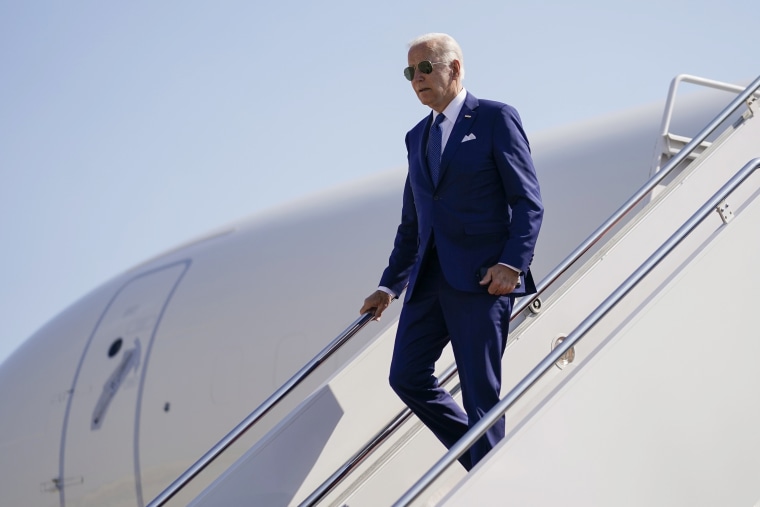BOWIE, Md. — On midterm election night, Joe Biden called to congratulate the victors he had campaigned for and was greeted with appreciation — and in some cases encouragement to mount a presidential bid against Donald Trump.
That was 2018.
It’s unlikely election night is going to be quite the same for him this go-round.
Democrats seem to be preparing themselves not for whether Tuesday night is going to be bad for them, but rather how bad.
Biden advisers touted the wins of candidates he had endorsed and stumped for in 2018 as they made an electability argument heading into 2020. Now, the president's aides and advisers insist that Tuesday’s outcome — whatever it is — will not be a factor in his decision on whether to seek a second term in the White House.
A Biden campaign alumnus, speaking on the condition of anonymity, noted that only twice in the last century has a president’s party gained seats in his first midterm election — 1934 and 2002.
And the calculation is different for a popular former vice president then for an unpopular officeholder.
“The key differential between 2018 and 2022 is that in 2018 Joe Biden was not president,” the former official said.
Biden allies’ chief argument is based on historical precedent — Presidents Bill Clinton and Barack Obama both suffered mightily in their first midterms, only to win another term two years later. They also point to historic polls showing Americans want a check on the party in power, suggesting that a president's losses in a midterm are less about the person in the Oval Office and more about American political tendencies.
Biden allies also point to early polling that shows Biden narrowly ahead in a potential rematch against former President Donald Trump, who hinted Monday night at a rally that he’ll launch his own bid for re-election in a week.
“You have an incumbent with a really good track record, and you’ll have Donald Trump [running],” said Jim Messina, who ran Obama’s re-election campaign in 2012. “The incumbent has already beaten Donald Trump.”
It’s an echo of 2020, when Biden’s biggest strength was the perception that he was the strongest Democratic candidate against Trump. His campaign noted how, in 2018, he headlined rallies in more than a dozen races that helped swing control of Congress to Democrats.
This year has been different.
Democrats in some of the toughest races largely shied away from Biden, preferring popular surrogates, like Obama or first lady Jill Biden.
In 2018, Biden held his final rally in a Pennsylvania county that had the largest swing from 2008 to 2016. But this year, Biden’s final rally was in a blue state, Maryland, with a governor’s race that isn’t expected to be close.
While Biden allies point to the historical trends against a first-term president’s party, there’s at least one key difference: Clinton and Obama were in their late 40s when they took a midterm shellacking, while Biden is set to turn 80 this month. In 2020, he hinted about being a “bridge” to a new generation of Democrats, but in recent months has repeatedly said he “intends” to seek another term.
And Biden’s favorable ratings have also plunged under the weight of inflation and voter discontent with the state of the country, with multiple polls this year showing that even Democrats aren’t sold on the idea of Biden seeking another term.
The former Biden adviser argued that the president’s agenda “is popular and has been unifying for congressional Democrats.”
“But people are feeling the pain of inflation that is a force all over the world, and the right combination of words cannot make that evaporate,” the adviser added.
For now, Biden has only offered this response to Democrats worried about his political and physical health: “Just watch me.”
His closing weeks on the campaign have offered him a chance to test-drive potential arguments for a future campaign, including explicit contrasts with his predecessor.
“The question that we face heading into 2024 is the same question we faced in the last several years, which is who can beat Donald Trump,” said Ben LaBolt, who was national press secretary for Obama’s 2012 re-election campaign. “When Donald Trump reappears on the campaign trail, goosebumps are going to go up across the country among Democrats and persuadable voters. And then I think these concerns about President Biden that you’ve seen in the press — I think that will wash away when the threat of a return of President Trump will become very real.”
LaBolt noted that Biden’s inner circle includes veterans of both Clinton’s and Obama’s successful turnarounds and the playbook that got them there.
Messina said a Republican Congress would also give Biden an opportunity to rally Democrats to his side.
“None of this is Joe Biden’s doing, and doesn’t materially affect his re-election,” he said. “After taking over, these guys are going to overstep. They’re going to give the president opportunities to draw stark contrasts.”

